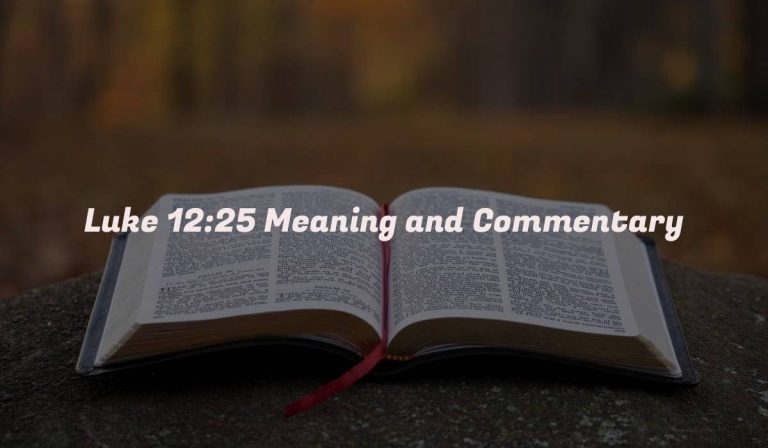27 Bible Verses about Armor-Bearer (With Commentary)

In the ancient times, an armor-bearer played a crucial role in supporting and protecting warriors on the battlefield. But what does the Bible say about this noble position? Through inspiring verses, we gain insight into the responsibilities and virtues of an armor-bearer.
Join me as we delve into these verses, exploring the significance of this role and discovering the lessons we can apply to our lives as faithful servants of God and others.
Bible Verses about Armor Bearer
1 Samuel 14:7
“Do all that you have in mind,” his armor-bearer said. “Go ahead; I am with you heart and soul.”
In this verse, Jonathan’s armor-bearer demonstrates unwavering loyalty and commitment to his leader. His willingness to support and accompany Jonathan into battle reveals the vital role of an armor-bearer as someone who stands by, protects, and assists their leader in times of conflict.
Judges 9:54
“Quick, take your sword and kill me,” his armor-bearer said, “so that they can’t say, ‘A woman killed him.’”
This verse portrays the tragic ending of Abimelech, an oppressive ruler. When his armor-bearer witnessed his imminent defeat, he requested a swift death to avoid the disgrace of being killed by a woman. This passage serves as a reminder that an armor-bearer’s dedication may extend to the point of sacrificially protecting their leader’s reputation.
1 Samuel 31:5
“When the armor-bearer saw that Saul was dead, he too fell on his sword and died with him.”
Here, in the aftermath of Saul’s defeat, his armor-bearer witnesses the king’s demise. Overwhelmed by grief and loyalty, the armor-bearer chooses to end his own life, aligning himself even in death with his fallen leader. This illustrates the depth of trust and loyalty that can exist between an armor-bearer and the one they serve.
2 Kings 9:32
“He looked up at the window and called out, ‘Who is on my side? Who?’ Two or three eunuchs looked down at him.”
In this verse, Jehu, anointed as the new king, calls for support from his followers. The response comes from two or three eunuchs, often serving as armor-bearers. Their willingness to stand with Jehu emphasizes the importance of having reliable and dedicated armor-bearers who align themselves with their leader’s cause.
2 Samuel 23:37
“Zelek the Ammonite, Naharai the Beerothite, the armor-bearer of Joab son of Zeruiah.”
This verse mentions Naharai, Joab’s armor-bearer, among the list of David’s mighty warriors. Naharai’s inclusion in this esteemed group highlights the significance of an armor-bearer’s role in battle. They are not only companions and assistants but also valued for their bravery and skill in wielding weapons.
1 Chronicles 11:39
“Uriah the Hittite: thirty-seven in all.”
Among David’s mighty warriors, Uriah the Hittite is listed. While not explicitly mentioned as an armor-bearer, Uriah’s inclusion in this group suggests his role as a trusted and loyal warrior. He exemplifies the dedication and courage expected of an armor-bearer, faithfully serving and defending his leader.
1 Samuel 14:6
“Jonathan said to his young armor-bearer, ‘Come, let’s go over to the outpost of those uncircumcised men. Perhaps the Lord will act in our behalf. Nothing can hinder the Lord from saving, whether by many or by few.’”
Jonathan’s words to his armor-bearer reflect their shared faith and courage. They demonstrate the symbiotic relationship between a leader and their armor-bearer, with mutual trust and reliance on God’s intervention in battle. Together, they face the enemy, recognizing that victory is ultimately in the Lord’s hands.
2 Chronicles 23:7
“The Levites are to station themselves around the king, each with weapon in hand. Anyone who enters the temple is to be put to death. Stay close to the king wherever he goes.”
This verse outlines the responsibilities of the Levites, who were assigned as armor-bearers to protect the king and ensure the security of the temple. Their duty was to maintain the sanctity of the sacred space and safeguard the king’s life. This highlights the role of an armor-bearer as a guardian, defending their leader and sacred spaces from potential threats.
1 Samuel 17:7
“His spear shaft was like a weaver’s rod, and its iron point weighed six hundred shekels. His shield bearer went ahead of him.”
In the famous account of David and Goliath, Goliath is accompanied by a shield bearer. The shield bearer’s role was to provide additional protection for Goliath, ensuring that he was shielded from enemy projectiles. This verse reminds us of the importance of an armor-bearer’s task to shield and safeguard their leader from harm.
1 Samuel 14:12
“The men of the outpost shouted to Jonathan and his armor-bearer, ‘Come up to us, and we’ll teach you a lesson.’”
Here, Jonathan and his armor-bearer are challenged by the enemy forces. The bravery and audacity of these two warriors, facing overwhelming odds, is a testament to the trust and courage shared between a leader and their armor-bearer. Their boldness inspires others to step forward and engage in battle.
1 Samuel 14:13
“Jonathan climbed up, using his hands and feet, with his armor-bearer right behind him. The Philistines fell before Jonathan, and his armor-bearer followed and killed behind him.”
This verse illustrates the teamwork and coordination between Jonathan and his armor-bearer. Jonathan takes the lead in scaling the terrain, engaging the enemy, and inspiring fear among the Philistines. Meanwhile, the armor-bearer diligently follows, providing support and assisting in the defeat of their adversaries.
2 Samuel 23:18
“Abishai the brother of Joab son of Zeruiah was chief of the Three. He raised his spear against three hundred men, whom he killed, and so he became as famous as the Three.”
Abishai, known for his exceptional bravery and skill, serves as Joab’s armor-bearer. He is credited with tremendous feats of valor, including single-handedly defeating three hundred enemies. This verse emphasizes the extraordinary capabilities and contributions of an armor-bearer, who often played a pivotal role in battle.
2 Samuel 20:8
“When they were at the great rock in Gibeon, Amasa came to meet them. Joab was wearing his military tunic, and strapped over it at his waist was a belt with a dagger in its sheath. As he stepped forward, it dropped out of its sheath.”
In this passage, Joab encounters Amasa, whom he intends to deceive and kill. Joab’s attire, including his military tunic and belt with a hidden dagger, highlights the preparedness and vigilance required of an armor-bearer. They were responsible for ensuring their leader’s safety and being ready to defend them at any moment.
2 Samuel 23:19
“Was he not held in greater honor than the Three? He became their commander, even though he was not included among them.”
This verse refers to Benaiah, who served as an armor-bearer to King David. Despite not being initially counted among the mighty warriors, Benaiah’s exceptional courage and achievements elevated him to a position of great honor and authority. It exemplifies the potential for an armor-bearer to rise to positions of leadership and influence through their unwavering commitment and valor.
2 Samuel 23:22
“These things Benaiah son of Jehoiada did, and he gained a reputation among the Three mighty warriors.”
Benaiah, known for his remarkable feats of bravery, garners a distinguished reputation among the mighty warriors of David. His role as an armor-bearer underscores the importance of trust, loyalty, and fearlessness in serving one’s leader. Benaiah’s example serves as an inspiration for armor-bearers to be courageous and distinguish themselves through acts of valor.
2 Chronicles 18:33
“And a certain man drew his bow at random and struck the king of Israel between the scale armor and the breastplate.”
This verse recounts the unfortunate incident where an unidentified man randomly shoots an arrow during battle, striking King Ahab of Israel. The incident highlights the vulnerability of leaders and the critical role of armor-bearers in shielding them from harm. It underscores the need for constant vigilance and protection in the midst of conflict.
2 Chronicles 32:21
“And the Lord sent an angel, who annihilated all the fighting men and commanders and officers in the camp of the Assyrian king. So he withdrew to his own land in disgrace. And when he went into the temple of his god, some of his sons, his own flesh and blood, cut him down with the sword.”
This verse narrates the downfall of Sennacherib, the king of Assyria, who was defeated by divine intervention. Though not explicitly mentioned, it can be inferred that the armor-bearers of the opposing forces played a significant role in this victory. The passage emphasizes that an armor-bearer’s faithfulness and dedication can contribute to the downfall of even the mightiest adversaries.
1 Samuel 17:49
“Reaching into his bag and taking out a stone, he slung it and struck the Philistine on the forehead. The stone sank into his forehead, and he fell facedown on the ground.”
This verse describes David’s astonishing triumph over the Philistine giant, Goliath. David’s courage, skill, and reliance on God’s strength are often highlighted in this account. However, it’s essential to recognize that David’s victory was made possible in part by the support and assistance of his armor-bearer. The passage serves as a reminder that even seemingly insurmountable obstacles can be overcome with faithful companionship and divine intervention.
1 Chronicles 12:8
“Some Gadites defected to David at his stronghold in the wilderness. They were brave warriors, ready for battle and able to handle the shield and spear. Their faces were the faces of lions, and they were as swift as gazelles in the mountains.”
In this verse, the Gadites, known for their exceptional bravery and agility, join forces with David. While not explicitly mentioned as armor-bearers, their proficiency in handling shields and spears suggests their suitability for such a role. Their fierce loyalty and formidable abilities complement the unity and strength of David’s army.
Judges 9:54
“Quick, take your sword and kill me,” his armor-bearer said, “so that they can’t say, ‘A woman killed him.’”
This verse portrays the tragic ending of Abimelech, an oppressive ruler. When his armor-bearer witnessed his imminent defeat, he requested a swift death to avoid the disgrace of being killed by a woman. This passage serves as a reminder that an armor-bearer’s dedication may extend to the point of sacrificially protecting their leader’s reputation.
2 Kings 9:32
“He looked up at the window and called out, ‘Who is on my side? Who?’ Two or three eunuchs looked down at him.”
In this verse, Jehu, anointed as the new king, calls for support from his followers. The response comes from two or three eunuchs, often serving as armor-bearers. Their willingness to stand with Jehu emphasizes the importance of having reliable and dedicated armor-bearers who align themselves with their leader’s cause.
2 Samuel 23:37
“Zelek the Ammonite, Naharai the Beerothite, the armor-bearer of Joab son of Zeruiah.”
This verse mentions Naharai, Joab’s armor-bearer, among the list of David’s mighty warriors. Naharai’s inclusion in this esteemed group highlights the significance of an armor-bearer’s role in battle. They are not only companions and assistants but also valued for their bravery and skill in wielding weapons.
1 Chronicles 11:39
“Uriah the Hittite: thirty-seven in all.”
Among David’s mighty warriors, Uriah the Hittite is listed. While not explicitly mentioned as an armor-bearer, Uriah’s inclusion in this group suggests his role as a trusted and loyal warrior. He exemplifies the dedication and courage expected of an armor-bearer, faithfully serving and defending his leader.
1 Samuel 14:6
“Jonathan said to his young armor-bearer, ‘Come, let’s go over to the outpost of those uncircumcised men. Perhaps the Lord will act in our behalf. Nothing can hinder the Lord from saving, whether by many or by few.’”
Jonathan’s words to his armor-bearer reflect their shared faith and courage. They demonstrate the symbiotic relationship between a leader and their armor-bearer, with mutual trust and reliance on God’s intervention in battle. Together, they face the enemy, recognizing that victory is ultimately in the Lord’s hands.
2 Chronicles 23:7
“The Levites are to station themselves around the king, each with weapon in hand. Anyone who enters the temple is to be put to death. Stay close to the king wherever he goes.”
This verse outlines the responsibilities of the Levites, who were assigned as armor-bearers to protect the king and ensure the security of the temple. Their duty was to maintain the sanctity of the sacred space and safeguard the king’s life. This highlights the role of an armor-bearer as a guardian, defending their leader and sacred spaces from potential threats.
These verses provide insights into the significance of armor-bearers in biblical narratives, showcasing their loyalty, bravery, and dedication in serving their leaders. It is a reminder that the role of an armor-bearer extends beyond physical protection, encompassing support, trust, and unwavering commitment.
What does the Bible say about Armor Bearers?
In the Bible, an “Armor Bearer” refers to a person who served as a companion and assistant to a warrior or a leader, specifically in the context of military endeavors. The term is mentioned in several passages in the Old Testament, most notably in the stories of King Saul and King David.
The role of an Armor Bearer involved carrying and safeguarding the armor and weapons of the leader, providing essential support on the battlefield, and standing by their side in times of conflict. This position required loyalty, courage, and trustworthiness, as the Armor Bearer’s actions directly impacted the safety and well-being of the leader they served.
One of the most well-known accounts of an Armor Bearer in the Bible is the story of David and Jonathan. Jonathan, the son of King Saul, had an Armor Bearer who demonstrated exceptional loyalty and bravery, standing with him in battle against the Philistines (1 Samuel 14). Similarly, when David was a young man fleeing from Saul’s pursuit, he had faithful Armor Bearers who supported him during that time (1 Samuel 21:7).
While the concept of an Armor Bearer is not directly emphasized in the New Testament, the principles of loyalty, support, and service to leaders can be found throughout the teachings of Jesus and the apostles. The New Testament encourages believers to serve and support one another in love, humility, and faithfulness.
Overall, the role of an Armor Bearer in the Bible serves as an example of the importance of loyalty, trust, and support in serving leaders and working together in times of challenge and conflict. It is a reminder of the value of selfless service and dedication in building strong and united communities.






